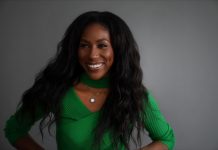
Citizens of Ypsilanti, your attention please: Leo Sheng wants you to know he appreciates growing up in your fine community, and he means you no insult. However, nearly every biography published about Sheng, the meteoric young actor co-starring in the upcoming Showtime reboot The L Word: Generation Q, states he grew up “in a small town outside of Ann Arbor, Michigan.” Wouldn’t that be like, Chelsea?
“That’s funny,” the 23-year-old acknowledges. “That probably comes from me talking to so many people who aren’t from Michigan. Ypsilanti isn’t that small, but nobody knows about it. I keep trying to describe Ypsi, and people just look at me.”
Sheng, who was adopted from Hunan, China as an infant, grew up near Eastern Michigan University, steps away from the campus apartments and student haunts. “You [could] smell [Dom Bakeries] from our house. I love Dom’s,” he says.
Despite his proximity to Eastern, Sheng decided to go a bit further away to college — but not too far. He enrolled at the University of Michigan in 2014, where his accidental acting career began. Originally, his path was in creative writing, but his freshman year, his interest switched to film. He eventually decided on sociology but continued pursuing his passion for the arts and went on to produce two independent films screened at the Michigan Theater.
His jump to major film and TV roles reads like a latter-day Lana Turner story. Sheng chronicled his transition as a transgender man on Youtube, Tumblr, Instagram, and other social media platforms. This led to writing contributions on LGBTQ issues in the Huffington Post and MTV Voices, and he gained popularity with thousands of Twitter and Instagram followers. Pre-transition photos of him as a child as well as ones post top surgery were shared and later posted on people.com.
“There’s a student film organization, M-agination, and every semester you can send in your script and the board decides on a handful to be made,” Sheng explains. “The first one I wrote and attempted to direct. I knew nothing about writing or directing. I was winging it, but I knew I wanted to portray a queer love story, which I did.
“Looking back, I wish I had made them a little happier. Both of the films are kind of sad, which happens way too much in Hollywood. But they were also really great learning experiences.”
Experience counts. After graduating from U-M in 2017 with a Bachelor of Arts in sociology, Sheng was preparing to pursue a U-M graduate degree in social work, following in the career footsteps of his two adoptive moms. “I was totally set to start grad school,” he says, “and right before orientation I see an Instagram message from a casting agency in New York. It said, ‘Hey, we’re looking for trans actors to audition for an upcoming feature. If you’d like more information, please send us an email.’ They must have seen my profile online.
“But the message was a week old! I’m like, ‘It’s late, but on the chance they still want my audition, why not?’ ” Before he knew it, Sheng was on a plane to New York to spend eight weeks shooting the much-talked-about film Adam, based on the 2014 novel by Ariel Schrag. Released this summer and directed by Transparent producer Rhys Ernst, the film premiered in January at the Sundance Film Festival. “I’m emailing the School of Social Work saying, ‘I need to defer a year. I have an opportunity I really can’t pass up! What do I need to do?’ ” he recalls excitedly. “It was a whirlwind time.”
He may need to beg for another extension. Adam indirectly led to his role in Generation Q, which will premiere on Showtime at 10 p.m. Dec. 8. He joins returning L Word stars Jennifer Beals, Leisha Hailey, and Kate Moennig from the groundbreaking drama that ran from 2004-2009 about the lives and loves of friends — mostly lesbians and bisexual people — living in West Hollywood.
“I feel a big responsibility to use my platform to ask other East Asian queer folks to show solidarity to support and uplift our queer siblings. Especially now.”
– Leo Sheng
In Generation Q, Sheng plays the role of Micah Lee, who is described in the pay-cable channel’s advance publicity as “a soft-spoken adjunct professor forced to confront his fear of vulnerability.”
“He’s a professor of social work, which I love, because that’s what I was studying,” Sheng says. “It must be something about reboots that they always poke fun at their original series, but what’s great about this show is that, yeah, there are some jokes, but what we’re really focusing on is where these characters are today. They are all living their lives, navigating drama and love, but it’s changed. The way we talk about things as a society has changed. Language has changed.”
As for his character, “He’s trying to figure out what he wants with his life,” Sheng says. “Micah is the friend who really listens and tries to give advice but doesn’t follow his own advice. And what I love is that Micah’s storyline involves him being trans, but it’s not only about him being trans.”
“The thing that got us so excited about Leo is his incredible warmth and vulnerability,” praises Marja-Lewis Ryan, Generation Q showrunner and executive producer. “We immediately felt like we knew him and wanted to root for him. We truly cannot wait for the fans — new and old — to feel that, too.”
And if Sheng thought his visibility on Instagram was powerful (@ileosheng), just wait. “I think a lot about that, definitely,” he says. “People keep telling me, ‘Your platform is going to expand even more now,’ and there’s a lot of responsibility.”
Sheng factors his race into this responsibility. “I am often perceived as this gender so I can move through the world without people questioning it, and there’s safety there. I’m not white, but I’m also not black or Latino, so I also have privilege in that I am not targeted for my race and my gender the way lots of trans folks of color are. So I feel a big responsibility to use my platform to ask other East Asian queer folks to show solidarity to support and uplift our queer siblings. Especially now.”
As his celebrity and bank account grow, would he consider a return to China? “I think about that a lot, too,” Sheng admits. “I know the province I was adopted from, but I don’t know much about my biological family.
“The older I get, the desire does get stronger, but it also becomes more complicated,” he says. “I was adopted during China’s one-child policy, which only ended a few years ago. I know certain generations of East Asians would ask, ‘You’re a boy. Why were you adopted out?’
“If I found my family, what would their reaction be? As far as they knew, they gave up a daughter. So when I think about going back, it’s difficult.”
|
|
|











